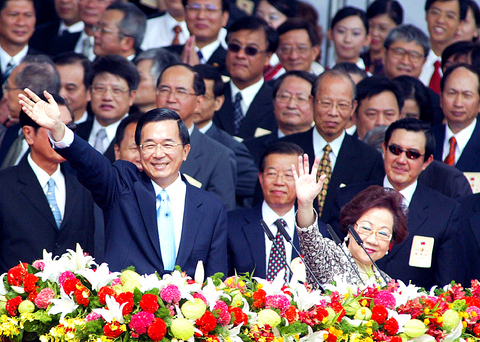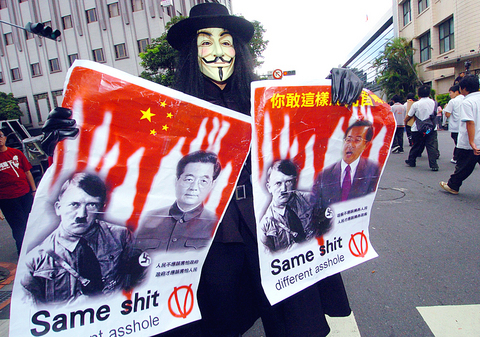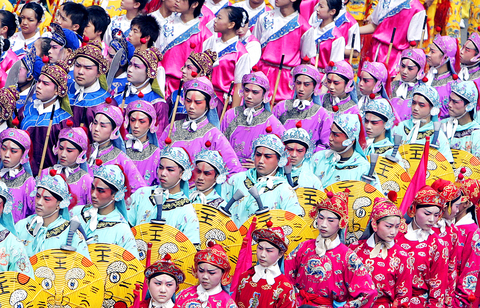President Chen Shui-bian (陳水扁) yesterday proposed canceling the Double Ten National Day celebrations for good, amid protests staged by opposition lawmakers at the ceremony held in front of the Presidential Office.
"Because this kind of national day celebration raises so much conflict, and so many people attend the event not to celebrate but to pursue their political agenda, A-bian [Chen's nickname] suggests that the necessity of the event be reviewed, with the possibility of canceling it in future," Chen said in his national day address to the crowd, which included foreign dignitaries and overseas Taiwanese.
Chen made the remarks as red-clad opposition lawmakers, who were separated into two sections near the main podium, began to disrupt the ceremony, making thumbs-down gestures and holding red banners that read "A-bian, step down" and "Depose."

Vice President Annette Lu (
The event marked Wu's first public appearance after a long hiatus reportedly due to illness.
Chen said that freedom of speech is a constitutional right, but he also called for national unity.

PHOTOS: CNA AND LO PEI-DER, TAIPEI TIMES
"Taiwan is a liberal democracy where different opinions are respected and protected by the law," he said. "Different people have different opinions, but they cannot sabotage national solidarity. Different people have different national identifications, but they cannot divide the country nor drive the government into an idle spin."
Chen said that the 23 million people of Taiwan are all in the same boat, regardless of their differences or political affiliations.
"We respect the right of free choice, but it is our common responsibility to facilitate the nation's development and growth," he said. "Only with greater unity can we weather the storm and sail toward a brighter future."

PHOTO: WALLY SANTANA, AP
Chen also condemned North Korea's claim to have detonated an atomic weapon in an underground test on Monday.
"[The test] is a provocative act seriously threatening regional peace and stability," he said. "I am calling on the international community to seriously evaluate the lack of security mechanisms in Northeast Asia."
Unlike with North and South Korea, Chen said, there was no multi-party dialogue platform such as the six-party talks between Taiwan and China.
Chen urged the international community to include Taiwan in the regional system in a bid to ensure peace and stability in the Taiwan Strait and the Asia-Pacific region.
As a member of the global democratic community, Chen vowed to strengthen Taiwan's self-defense capabilities and expressed the hope of working with the international community to build a more democratic and peaceful world.
Chen said that he understood that many schools and civic groups had declined to attend yesterday's celebrations.
"I'm glad that they are free to express their opinions, unlike 50 years ago," he said.
"As Taiwan has transformed its government from an authoritarian regime to a democracy, it is time to conduct a thorough review of the practice of mobilizing students to involuntarily attend an event," he said.
Chen then showed an autographed baseball and photograph of Taiwanese New York Yankees pitcher Wang Chien-ming (
Wang wrote "Taiwan, jiayou! (an expression of encouragement)" on the ball and the photograph, and Chen led the crowd in chanting "Taiwan jiayou!" and "Jiayou, zai jiayou!"
Before making the speech outside the Presidential Office building, Chen delivered a speech to Cabinet officials in the auditorium of the Presidential Office.
The president described an opposition-initiated recall motion as "a new chapter in the partisan struggle" which has persisted since the transfer of power in 2000.
"Combating corruption has always been at the top of my political agenda," he said. "All are equal before the law, including the president and his family, and there is no exception."
As the justice system is the last line of defense for social justice, Chen called on the public to have faith in the legal system and give investigators time to conduct an independent inquiry.
It is a perversion of democracy and the rule of law if some people doubt the fairness of the judicial system simply because a legal finding is at odds with their desires, Chen said.
The political unrest over the past six years reflects the fact that the opposition parties have refused to cope with the reality that they lost power democratically, Chen said, adding that the country faces a dilemma common to other emerging democracies.
On relations with Beijing, Chen said that as long as China continued its one-party, authoritarian rule, it would be difficult to make a substantial breakthrough in cross-strait relations unless Chinese leaders acknowledge the universal ideals of freedom, democracy and human rights.
Chen then urged the legislature to pass a long-delayed arms procurement package to boost the nation's leverage at the negotiating table.
"We don't intend to engage in a military competition with China, nor do we want to intensify cross-strait tensions," he said. "We are instead investing in peace, security and stability."
In response to Chen's speech, the Chinese Nationalist Party (KMT) condemned the president for bringing up the issue of integrity even as he and his family members were being accused of involvement in corruption scandals.
Chen's remarks, along with the suggestion that the Double Ten National Day rally be scrapped and criticism of the opposition's recall motion, showed that the president was no longer competent in the position, KMT Spokesman Huang Yu-cheng (
"As the nation's leader, President Chen suggested that the celebrations should not be held. Did he make the suggestion because he knew that he will no longer be president next year?" Huang asked at a press conference at the party's headquarters.
On Chen's criticism of the recall motion, Huang lashed out at the president for lacking the ability to "reflect."
KMT Chairman Ma Ying-jeou (
"This is the only feasible way to oust President Chen," Ma said at Taipei City Hall.
People First Party Chairman James Soong (
"We will do anything we can to pressure A-bian and the DPP, and let them know our resolve to oust A-bian," he said.
Additional reporting by Mo Yan-chih

TRAGEDY STRIKES TAIPEI: The suspect died after falling off a building after he threw smoke grenades into Taipei Main Station and went on a killing spree in Zhongshan A 27-year-old suspect allegedly threw smoke grenades in Taipei Main Station and then proceeded to Zhongshan MRT Station in a random killing spree that resulted in the death of the suspect and two other civilians, and seven injured, including one in critical condition, as of press time last night. The suspect, identified as a man surnamed Chang Wen (張文), allegedly began the attack at Taipei Main Station, the Taipei Fire Department said, adding that it received a report at 5:24pm that smoke grenades had been thrown in the station. One man in his 50s was rushed to hospital after a cardiac arrest

SAFETY FIRST: Double the number of police were deployed at the Taipei Marathon, while other cities released plans to bolster public event safety Authorities across Taiwan have stepped up security measures ahead of Christmas and New Year events, following a knife and smoke bomb attack in Taipei on Friday that left four people dead and 11 injured. In a bid to prevent potential copycat incidents, police deployments have been expanded for large gatherings, transport hubs, and other crowded public spaces, according to official statements from police and city authorities. Taipei Mayor Chiang Wan-an (蔣萬安) said the city has “comprehensively raised security readiness” in crowded areas, increased police deployments with armed officers, and intensified patrols during weekends and nighttime hours. For large-scale events, security checkpoints and explosives

A car bomb killed a senior Russian general in southern Moscow yesterday morning, the latest high-profile army figure to be blown up in a blast that came just hours after Russian and Ukrainian delegates held separate talks in Miami on a plan to end the war. Kyiv has not commented on the incident, but Russian investigators said they were probing whether the blast was “linked” to “Ukrainian special forces.” The attack was similar to other assassinations of generals and pro-war figures that have either been claimed, or are widely believed to have been orchestrated, by Ukraine. Russian Lieutenant General Fanil Sarvarov, 56, head

PUBLIC SAFETY: The premier said that security would be tightened in transport hubs, while President Lai commended the public for their bravery The government is to deploy more police, including rapid response units, in crowded public areas to ensure a swift response to any threats, President William Lai (賴清德) said yesterday after a knife attack killed three people and injured 11 in Taipei the previous day. Lai made the remarks following a briefing by the National Police Agency on the progress of the investigation, saying that the attack underscored the importance of cooperation in public security between the central and local governments. The attack unfolded in the early evening on Friday around Taipei Main Station’s M7 exit and later near the Taipei MRT’s Zhongshan